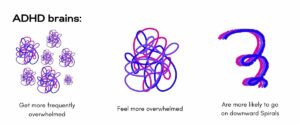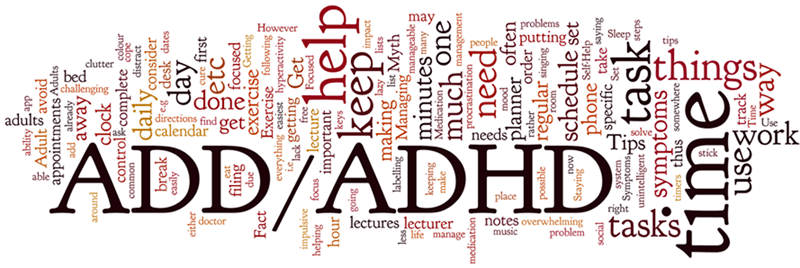Do you feel like everything is too loud, too bright, or just too much? If you have ADHD, chances are you experience heightened sensitivity to your environment. This can be incredibly overwhelming and lead to feelings of overstimulation. In this blog post, we will discuss strategies for coping with increased sensitivity to improve your quality of life.
Contents
What Is Overstimulated ADHD?
Overstimulated ADHD is a term used to describe the experience of increased sensitivity in people with attention deficit hyperactivity disorder (ADHD). This may also include sensitivity to noise, light, touch, smell, or taste. For some people, this can make everyday activities and experiences incredibly overwhelming.
Overstimulation is a daily reality for many people with ADHD. We feel too much — physically as well as emotionally. We struggle with emotional regulation, impulsivity, as well as big feelings. Many of us also experience sensory sensitivities, reacting strongly to sights, tastes, smells, and more. And when we’re stressed, we feel everything more intensely.
Feeling overstimulation for someone with ADHD can be frustrating, embarrassing, and even painful. It can lead to feeling isolated and alone. But it is important to remember that you are not alone. Some strategies can help you cope with overstimulation and improve your quality of life.
Symptoms

There are a variety of symptoms that may be experienced as a result of overstimulation. These can include:
- feeling overwhelmed or out of control
- feeling anxious or irritable
- difficulty focusing or concentrating
- feeling dizzy or lightheaded
- increased heart rate
- shortness of breath
- constantly feeling on edge
- extreme restlessness
- urge to cover your ears or shield your eyes from too many stimuli
- sensitivity to unusual or new textures
- avoiding certain foods due to different flavors
- sweating
- trembling or shaking
Causes
Several factors can contribute to overstimulation in people with ADHD. These include:
- Genetics: People with ADHD are more likely to have sensitivities than those without the condition. This is thought to be due to genetic factors.
- Brain structure: The way the brains of people with ADHD are structured may make them more susceptible to feeling overwhelmed by their environment.
- Stress: Stress can exacerbate symptoms of ADHD and make people more sensitive to their environment.
- Stimulant medication: Stimulant medication is often used to treat ADHD. While these medications can be effective, they can also increase sensitivity in some people.
Effects

The effects of overstimulated ADHD can vary depending on the person. Some common effects include:
- Anxiety
- Irritability
- Trouble focusing
- Fatigue
- Headaches
- Muscle tension
- Trouble sleeping
These effects can make it difficult to participate in activities you enjoy or complete everyday tasks. Additionally, overstimulation can lead to meltdowns or shutdowns.
Meltdowns are when a person with ADHD becomes so overwhelmed that they cannot function. This may include crying, yelling, or becoming completely immobilized.
Shutdown is when a person withdraws from the world around them as a way of coping with overwhelming stimulation. This may look like disconnecting from conversations, staring off into space, or shutting down emotionally.
Both meltdowns and shutdowns can be incredibly distressing for the person experiencing them as well as those around them. It is important to remember that these reactions are not intentional and that the person is not trying to be difficult. They are simply coping the best way they know how.
Treatment

While ADHD has no permanent cure, there are a lot of ways that can help in managing and reducing the intensity of symptoms.
Medication
Medicines for treating overstimulation in ADHD include:
- Stimulants
- Non-stimulants
- Antidepressants
They help to improve focus, concentration, and energy levels.
If you are taking medication for ADHD, it is important to talk to your doctor about the possibility of side effects. Some medications can cause or worsen sensitivity. Your doctor can help you find a medication that is right for you and minimize any potential side effects.
Therapy
There are various therapeutic interventions used to treat overstimulated ADHD.
Cognitive-behavioral therapy (CBT) is a type of therapy that can help you understand and change the thoughts and behaviors that contribute to overstimulation.
Psychotherapy can help you understand and manage your emotions. It can also help you develop coping skills for dealing with overstimulation.
Support groups provide a space to share experiences, learn from others, and receive support. There are many online and in-person support groups available for people with ADHD.
Progressive muscle relaxation is a technique that involves tensing and also relaxing different muscle groups in the body. This can help to reduce stress and tension.
Deep breathing exercises can help to calm the nervous system and also improve focus.
Yoga and meditation can also help to reduce stress, anxiety, and overstimulation.
Aromatherapy uses essential oils to promote relaxation and provide other benefits.
Herbal supplements can also help to reduce stress and anxiety. Examples of supplements that may be helpful include: magnesium, omega-three fatty acids, probiotics, chamomile, and lavender.
All of these methods can help in the management of overstimulation. Be patient with yourself as you further experiment to find what works best for you. And remember, you are not alone. There are many people out there who understand what you are going through and can offer support.
Self Help Tips
There are several things you can do to cope with overstimulated ADHD. Here are some tips:
- Identify your triggers: What situations or activities tend to make you feel more sensitive? Once you know what your triggers are, you can try to avoid them or be prepared for them ahead of time.
- Avoiding triggers: Once you know what your triggers are, you can try to avoid them. This may not always be possible, but it can help to reduce your exposure to things that make you feel overstimulated.
- Pacing yourself: If you know you will be exposed to a trigger, try to pace yourself and take breaks as needed. This can help prevent you from feeling overwhelmed and stressed.
- Staying hydrated: Staying hydrated is important for overall health, but it can also help reduce the effects of overstimulation. Drink plenty of water throughout the day and carry a water bottle with you when you leave the house.
- Eating a healthy diet: Eating a healthy diet is important for overall health, but certain foods can also help reduce the effects of overstimulation. Foods that are high in omega-three fatty acids, such as salmon and flaxseed, can help to reduce inflammation.
- Exercise: Exercise is a great way to reduce stress and improve overall health. It can also help you sleep better, which can reduce fatigue.
- Getting enough sleep: Getting enough sleep is important for overall health and can help reduce the effects of overstimulation. aim for at least eight hours of sleep each night.
- Reducing stress: Reducing stress is important for overall health and can help reduce the effects of overstimulation. There are several ways to reduce stress, including exercise, relaxation techniques, and therapy.
- Create a sensory safe space: This may include things such as using noise-canceling headphones or earplugs, wearing sunglasses, or investing in a comfortable chair.
- Visualization: Visualization is a technique that can help you relax and reduce stress. It involves picturing a peaceful place or situation in your mind.
- Stimulate your senses in other ways: This could involve listening to soft music, eating certain foods, or using aromatherapy.
- Talk to someone: It can be helpful to talk to a therapist or counselor about your experiences with overstimulation. They can also provide support and guidance on how to cope with symptoms.
Conclusion
In conclusion, overstimulated ADHD can be difficult to cope with. This disorder can have a significant impact on an individual’s everyday life. It is important to identify your triggers and find ways to reduce your exposure to them.
For more information, please contact MantraCare. ADHD is a neurodevelopmental disorder characterized by difficulty in paying attention, hyperactivity, and impulsivity. If you have any queries regarding Online ADHD Counseling experienced therapists at MantraCare can help: Book a trial ADHD therapy session


